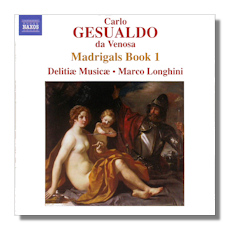
The Internet's Premier Classical Music Source
Related Links
- Gesualdo Reviews
- Latest Reviews
- More Reviews
-
By Composer
-
Collections
DVD & Blu-ray
Books
Concert Reviews
Articles/Interviews
Software
Audio
Search Amazon
Recommended Links
Site News
 CD Review
CD Review
Carlo Gesualdo di Venosa

Madrigals Book I
- Baci soavi e cari (I)
- Quanto ha di dolce amore (II)
- Madonna io ben vorrei
- Come esser puo ch'io viva?
- Gelo ha madonna in seno
- Mentre madonna (I)
- Ahi troppo saggia (II)
- Se da si nobil mano
- Amor pace non chero
- Si gioioso mi fanno i dolor miei
- O dolce mio martire
- Tirsi morir volea (I)
- Freno Tirsi il desio (II)
- Mentre mia stella miri
- Non mirar non mirare
- Questi leggiadri odorosetti fiori
- Felice primavera! (I)
- Danzan le ninfe (II)
- Son si belle le rose
- Bella angioletta
Delitiæ Musicæ/Marco Longhini
Naxos 8.570548
This is the first in a projected series of six CDs in which Delitiæ Musicæ will perform all Gesualdo's madrigals. (The ensemble is also under contract with Naxos for a 14-CD cycle of the complete Monteverdi madrigals.) Because they are such accomplished specialists in "early" Italian vocal repertoire, it's good to know that. In this release there is certainly more than a little promise.
The ensemble's style is refined; yet at the same time communicative and pleasantly "forward". Clear enunciation of each word is supported by intelligent articulation of the overall shape of each poem. That the members and director, Marco Longhini, of Delitiæ Musicæ treat each of these relatively short works (none lasts longer than three and a half minutes or has more than nine lines) as a "gem" is also to the good. The madrigal was a condensed and intense form. So every nuance of every word needs to count in its performance. It's also one of the hardest for 21st century ears and minds to relate to. It needs a freshness without idiosyncrasy, and an honesty without the fey – however mannered the poets' sentiments may seem to us now. At the same time Delitiæ Musicæ (Alessandro Carmignani, Paolo Costa, Fabio Furnari, Paolo Fanciulacci, Marco Scavazza, Walter Testolin) succeeds by the open and idiomatic ways in which they represent the conventions and tropes… the mistress' eyes, the kisses and the metaphorical juxtaposition of breast, armor and warrior, for example.
In common with most of those from the period, these madrigals each take a single and concentrated theme for their subject matter – usually sexual love and often not completely fulfilled. The selection here is a strong one with poetry by Tasso, Guarini, Gatti, Cassola, Alberti and Celiano. This range of what for Gesualdo (1566-1613) were contemporary poets illuminates the challenges the composer faced, and how he solved them in ways to which we – 400 years later – can still respond with enthusiasm. It's to Delitiæ Musicæ's credit that we so easily and willingly identify ourselves with the thwarted, curious, confident, shy and passionate lovers. The singers deftly achieve a style which is in turns, sad, inquisitive, optimistic, timid and ardent – but without ever having to act: this very immediate and persuasive singing can only come with deep and prolonged familiarity with the music. And with a conviction of its ability to communicate such emotions unselfconsciously. Thus their own delivery is intimate with all the risks associated with being intimate. Yet totally genuine, somehow knowingly transparent. And successful.
There are one or two odd choices of inclusion: only Part I of Mentre madonna by Tasso; it's such a compelling vignette that one longs to know what happened next. And only the second part of Quanto ha di dolce amore. Eventually we shall have them all. But there's something to be said for not keeping us waiting.
Interestingly, there's no surfeit of comparable recordings. One that contains the first three Books of Madrigals and can also be recommended is that on Cpo (777138) by the Gesualdo Consort under Harry Van der Kamp. This as usual well-priced hour's worth on Naxos, though, makes an attractively stylish alternative: the recording takes Gesualdo's music on its own terms. They see no need to play up the extraordinary nature of Gesualdo, or his harmonies etc. Rather, Longhini and his five male singers have placed the totality of this music squarely in the tradition of Italian Renaissance music. The result here is a compelling, melodious and satisfying blend of words and music that can stand its own with other exponents of the genre.
The CD comes with an informative essay on the music and its background. All the texts are presented, in Italian with English translations. The acoustic is close yet far from claustrophobic. We should eagerly await further volumes in this series.
Copyright © 2010, Mark Sealey.





















